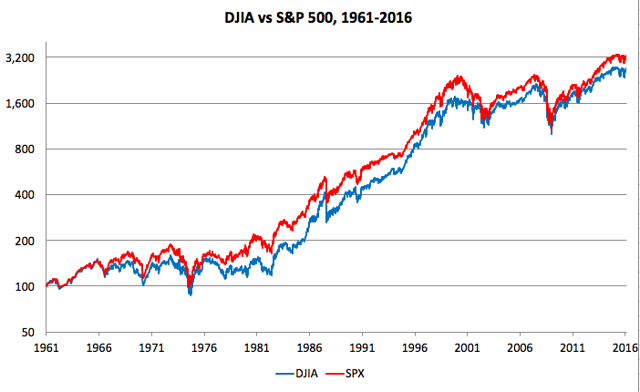#566111
Postby 1nvest » February 3rd, 2023, 6:24 pm
Sort a number of stocks worst to best, left to right tails, and typically the rightmost will outweigh the leftmost. One stock might double, another half (next month/year/whatever and those individual outcomes might have totally flipped such that they both compounded to zero gain/loss). The arithmetic mean is positive, -50 on the left, +100 on the right.
Some suggest you have to hold the entire haystack (market) in order to capture the few great winners, but that's wrong. Its fractal. Hold fewer stocks and the left/right tails wont be as tall as if you hold many more stocks, but in having distributed capital across fewer stocks you have more invested in the best/worst cases. 100 stocks, best gains +100% but with only 1% exposure to that, or 10 stocks, best gains +10% and where you have 10% exposure to that.
So within limits, holding say 16 stocks can compare in total return to holding 100 stocks.
What about rebalancing? Again it washes. Measure 30 year outcomes for rebalanced and non-rebalanced and they tend to end with similar outcomes. The non-rebalanced tending to end with a higher weighting in the asset(s) that were the more rewarding, the rebalanced holding less, having sold some to add to other assets.
Pick a individual asset, or a individual investor, and they're more inclined to lag the 'average'. As most stocks out of a bunch of stocks lags the average. In a sense captures the geometric, rather that the arithmetic.
All-stock is suggested as being more rewarding that stock/bond blends, however again that isn't accurate. In around 20% of cases all-stock will lag stock/bond. For a large chunk of cases they achieve similar outcomes. Its only few great cases where all-stock considerably outshines, more often from a start date after deep stock prices declines. Pick a random start date and with all-stock you're inclined to do no better/worse than a stock/bond blend. A potential benefit however of stock/bond is that as/when deep declines in stocks occur, you might migrate bonds over to stocks, at least have loaded some capital in at lows and that can go on to yield great gains. In contrast the all-stock'er just rides through that volatility, are restricted to their particular choice of start date outcome.
Pyad's HYP advice was that 16 stocks was enough diversity (spread across sectors), and not to bother with rebalancing, just let that ride. Which mathematically might compare to rebalanced, but involves less trading and hence less costs (and maybe avoids taxable events also such as capital gains taxation on the shares sold as part of rebalancing).
Dividends matter? No. Generally a broad portfolio of a mixture of stocks compares to a portfolio of high yield stocks. Tally total returns, take the same amount of DIY dividends out of those total returns, and broadly the outcomes are no different.
